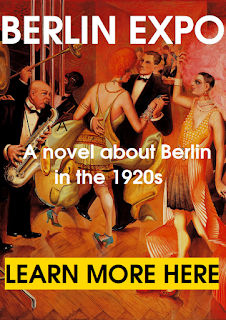Vienna and Berlin. Berlin and Vienna.
The two most populous German cities, but also the most important in terms of art and science, without denying the importance of Munich, Hamburg or Francfort.
But
the differences overshadow the similarities. Lutheran Berlin against
Catholic Vienna. Vienna, capital since centuries of a great empire
that, in 1914, went from the Mediterranean to the nearby Black Sea,
and where thirty languages were spoken. Berlin, which until
1871, was only capital of Prussia, a state among others in the space
we now call Germany.
Vienna
was for a long time the most important capital, it far surpassed
Berlin. But in 1871 the German Empire was founded by Bismarck and
Berlin became its capital. And, already in the 1920s, it exceeded
Vienna in population.
For
the Germans, Vienna was still synonymous with culture, but also
spirituality, sensuality, warmth. View from Berlin, Vienna was a city
of the south, almost Italian. Berlin in turn represented above all
modernity, economic but also cultural dynamism.
In
the wake of the Great War, Vienna was no longer the capital of an
empire but just of a small central-european country. If before the
war it could boast intellectual figures like Sigmund Freud, Stefan
Zweig, Hugo von Hoffmansthal, Adolf Loos, Gustav Klimt, she now lived
mainly of its glorious memories.
But
Berlin ... Berlin was still the capital of a great state, the largest
in Europe, with France. And it's as if all the creative force that
had abandoned Vienna had moved to Berlin. Because it is now, despite
inflation and misery, that the era of greatness of the Prussian
metropolis begins. The Weimar years.
The
relationship between those two cities is somewhat like the one between
Rome and ancient Greece, with Vienna in the Hellenic role. A city
admired by its past, by its charm somehow outdated.
Karl Kraus, the Viennese writer,
comes to Berlin around 1927. He is impressed but he disliked the in his view excessive avant-gardism. It is to him we owe the phrase : "In Berlin the situation is serious but not hopeless. In Vienna, it is indeed hopeless, but still not serious. "The Nobel Prize winner Elias Canetti,
another Viennese by adoption, comes at the same time. In his memoirs he writes: « Everything was close to one in Berlin, all kinds of influence was allowed. It was up to anyone to be noticed, if he was prepared to make the effort. For it was far from easy, there was a lot of noise and din. Still, in the midst of the bruhaha and the confusion, you were aware that there were things worth seeing and hearing. Everything was allowed, all prohibitions – which were many, especially in Germany – withered away in Berlin. Even though I came from an old capital like Vienna, I still felt like a country boy and watched everything with my eyes wide open. There was something sharp in the atmosphere, which teased and stimulated one. The horror and chaos that one met in Grosz's drawings was by no means overstated; it was natural here, one got used to it. Every attempt to cutt off from it was seen as perverted, the only thing still perceived as pervert, and if you succeeded in doing it, it quickly itched into your fingers again and you went out to meet the chaos once more. Everything was transparent, there was no intimacy.But what made the deepest impression on me was the incompatibility in everything that imposed on yourself. Every individual who was something, and they were numerous, had to force himself on the others.
It was important to show off: the visit to Romanisches Café (and on a higher level to Schlichter and Schwanecke) was a pleasure but not just that. It applied to everyone, also for the uninvited guests who went from table to table at Romanisches Café and always got something, as long as they held on to the figure they represented and did not tolerate it being distorted.”



No comments:
Post a Comment